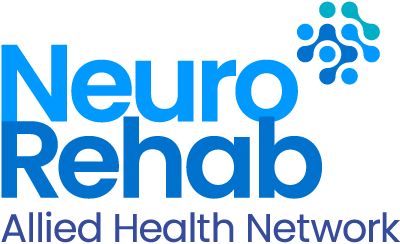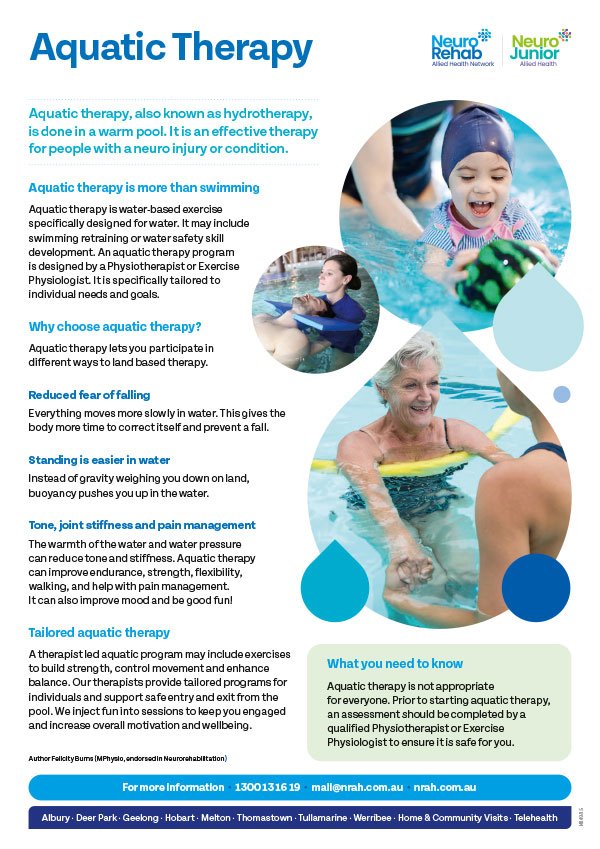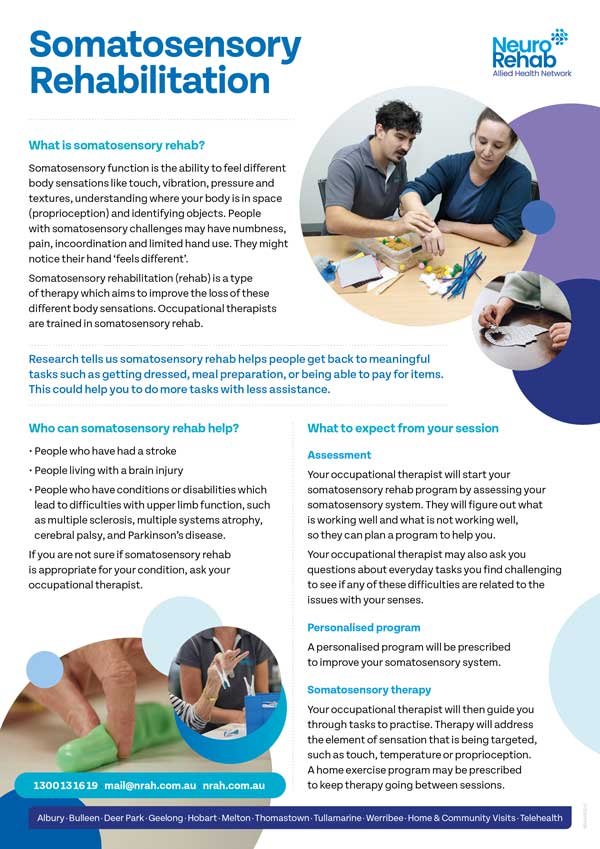Client Resources
Click on a link below to download a PDF flyer you can print at home or keep for future reference.
Multidisciplinary Team
A guide to working together to achieve your therapy goals. Click the link to download.
Multidisciplinary Team – NeuroJunior
A guide to working together to achieve your therapy goals. Click the link to download.
Physiotherapy
Aquatic Therapy
Aquatic Therapy is also known as Hydrotherapy. It is done in a warm pool. It is an effective method of rehab for people with a neuro injury or condition. Prior to starting Aquatic Therapy, an assessment should be completed by a qualified Physiotherapist or Exercise Physiologist to ensure it is safe for you. Click on the link to download the flyer.
The Bobath Concept
The Bobath Concept is a therapy technique with a strong focus on analysing movement and understanding that any part of the body can have an effect on the whole body. It aims to optimise movement recovery and potential for people with neurological conditions.
Dizziness & Vestibular Rehabilitation
A guide to how Physiotherapy can help dizziness and vestibular disorders. Click the link to download.
Feldenkrais Method
A guide to the Feldenkrais Method for people with neurological conditions. Click the link to download.
Breathing Exercises
In response to the current COVID-19 situation, it is important to be proactive in maintaining a healthy and clear chest by completing regular breathing exercises. Our Breathing Exercises leaflet describes a simple technique to encourage airway clearance. Click on the link below to download and print. The video demonstrates the technique. If you need further assistance, please contact us.
Allied Health Assistants
Allied Health Assistant Program
An Allied Health Assistant (AHA) can offer great value in supporting your therapy and rehabilitation goals. Click the link to download the info sheet.
Allied Health Assistant Program – NeuroJunior
An Allied Health Assistant (AHA) can offer great value in supporting your therapy and rehabilitation goals. Click the link to download the info sheet.
Dietetics
Dysphagia – The role of the Dietitian
Dysphagia refers to difficulty swallowing food or liquid. Many people living with neurological conditions and injuries, older people and young children are at risk of dysphagia. A Dietitian can assist clients with managing dysphagia and ensure they receive adequate nutrition. Click the link to download the info sheet.
Malnutrition – The role of the Dietitian
A guide to how a Dietitian can assist clients to improve health outcomes. Click the link to download the info sheet.
Weight Management – The role of the Dietitian
A guide to how a Dietitian can assist clients to manage weight. Click the link to download the info sheet.
Enteral Feeding – The role of the Dietitian
Enteral feeding, also known as tube feeding, refers to intake of food via the gastrointestinal (GI) tract. Click the link to download the info sheet.
Exercise Physiology
Music Therapy
Music Therapy for Parkinson’s Disease
Music Therapy can assist in the treatment of Parkinson’s Disease. Click the link to download the info sheet.
Speech Pathology
Videofluoroscopic Swallow Study
A Videofluoroscopic Swallow Study is a moving x-ray of swallowing. Click the link to download the info sheet.
Mealtime Management & Dysphagia
Dysphagia is the medical term for swallowing. Difficulties swallowing lead to serious health issues. Safe swallowing requires good coordination of multiple sensory messages and muscles. Click the link to download the info sheet.
Supporting Parents & Fussy Eaters
Tips for supporting your child’s sensory needs to make mealtimes less stressful. Click the link to download.
Occupational Therapy
Occupational Therapy For Upper Limb Rehabilitation
Occupational Therapy For Upper Limb Rehabilitation. Click the link to download the info sheet.
SENSe Program
SENSe is the Study of the Effectiveness of Neurorehabilitation on Sensation. NeuroRehab’s SENSe program is suitable for anyone whose sensation has changed after a stroke, at any age. It is proven to be effective even many years after a stroke. NeuroRehab’s SENSe program runs from our Deer Park and Bulleen clinics. You will be seen by a SENSe trained therapist twice weekly for 8 weeks.
Psychology & Neuropsychology
Looking After Your Mental Health (During COVID-19)
COVID-19 has brought many changes to the way we live. For people living with disability, there are added complexities. The Psychology team at NeuroRehab Allied Health Network has put together a list of Tips for Looking After Your Mental Health. Click the link to download the info sheet.
Psychology & Positive Behaviour Support
What to expect from Psychology and Positive Behaviour Support sessions with NeuroRehab Allied Health Network. Click the link to download the info sheet.
Telehealth
Telehealth
Telehealth is a healthcare appointment by video or phone with your allied health therapist. Telehealth has been shown to be the best way of delivering therapy to prevent transmission of COVID-19. It is cost-effective, convenient and accessible. Read more about Telehealth or click the link to download our Telehealth info sheet.
Telehealth – How to Set Up Your Video Call – Adults
A guide to setting up your device to undertake a Telehealth appointment. Click the link to download the info sheet.
Telehealth – How to Set Up Your Video Call – Children & Young People
A guide to setting up your device to undertake a Telehealth appointment. Click the link to download the info sheet.
Telehealth – Troubleshooting Guide
How to fix problems with your video call. Click the link to download the info sheet.































